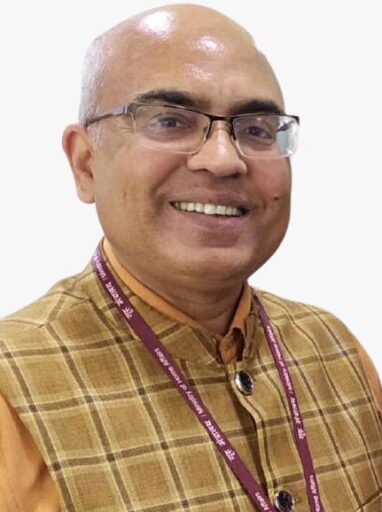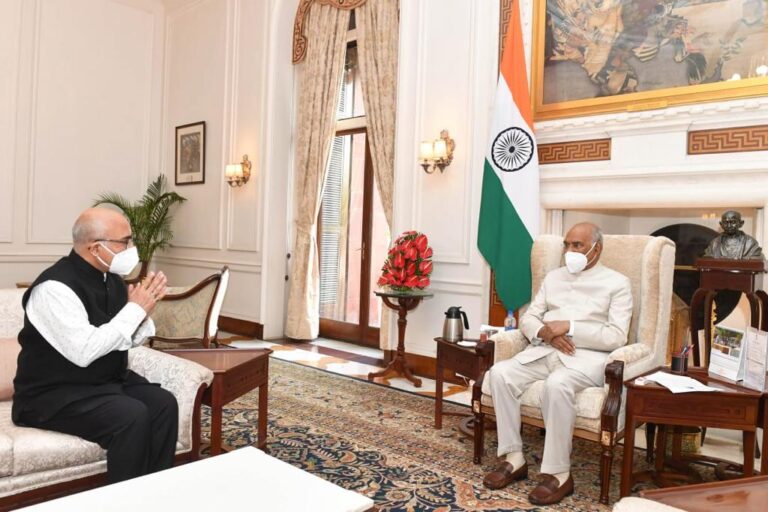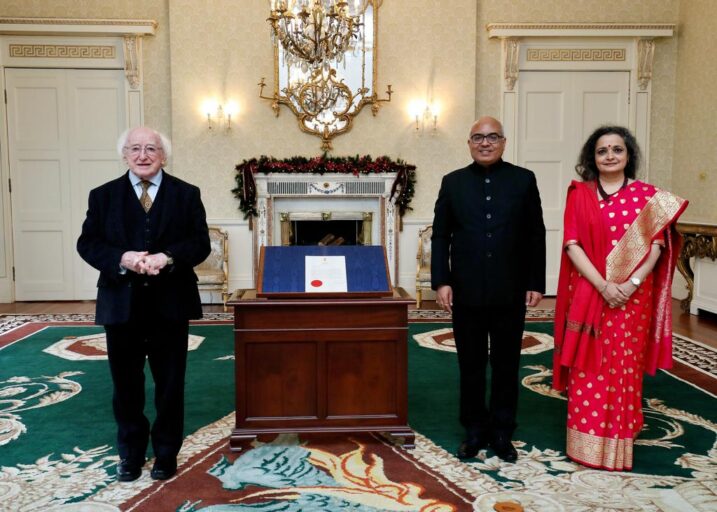No products in the cart.
Q&A with Ambassador Akhilesh Mishra (Indian Ambassador to Ireland)
In this Q&A session, Ambassador Akhilesh Mishra, an experienced career diplomat and India's Ambassador to Ireland, provides valuable insights into the role of an Ambassador, shares the challenges he faced throughout his career, and offers advice for aspiring civil servants. Gain a deeper understanding of the diplomatic world and learn from the experiences of a seasoned diplomat.
Ambassador Akhilesh Mishra is a career diplomat, an IFS officer with over three decades of rich experience in various roles spanning countries and continents. Currently serving as India’s Ambassador to Ireland, Ambassador Mishra has worked in Indian diplomatic missions in Peru, Italy, Nepal, the US, Tanzania, Afghanistan, and the Maldives, as well as at the Ministry of External Affairs in New Delhi. Originally from Varanasi, Ambassador Mishra has keen interest in Indian culture, especially Sanskrit Vedic and classical literature, Hindi and Urdu poetry, spirituality, yoga, and meditation. He generously shared some of his time with us to provide an inside view of life as a diplomat along with his valuable advice for the upcoming generation.
Q1. What does your role as an Ambassador entail?
A1. At the outset, I would like to thank Akhil Backliwal for reaching out to me and giving me this opportunity to share my thoughts with young Indians. The youth represent the future of any country, but nurturing the youth is particularly important for us considering our country’s unprecedented demographic advantage coupled with rising skill sets and Prime Minister Modi’s focus on transforming India into a manufacturing, innovation, and startup hub. The large young population of India is our biggest asset but also a collective national responsibility and challenge – to secure employment opportunities, provide appropriate skills and an enabling environment so that they can realize their full potential of creative energy and entrepreneurship. As an Indian and as an elder citizen, I do feel an obligation and duty to guide, mentor, encourage, and support the younger generation.
Moving on to the role of an Ambassador, an Ambassador (or High Commissioner) is the head of the Diplomatic Mission (Embassy or High Commission in Commonwealth countries) of their country and is the official representative of the Head of the State in the host country. For example, in my current assignment, I carried a ‘letter of credence’ from the Honorable President of India addressed to the Honorable President of Ireland, only after acceptance of this ‘credential’ by the Irish Head of State in November 2021, I became Ambassador to Ireland. Prior to that, I was Ambassador-designate to Ireland since my arrival in Dublin in early October.
As the official representative of India, my responsibility is to promote and safeguard India’s national interests in Ireland – broadening, diversifying, and deepening mutually beneficial linkages and collaborations to support our country’s agenda of socio-economic, technological development. At the functional level, an Ambassador’s role encompasses a broad spectrum of activities – enhancing political understanding on bilateral, multilateral, and global issues, trade, investment and technology flows, ties in education, sports, tourism, research, film and entertainment, and facilitation of people-to-people interactions through consular services, welfare of the diaspora. With the proliferation of media and social media, the areas of soft-power and cultural diplomacy as well as broader public engagement through instruments of public diplomacy are becoming increasingly important for us.

Q2. What are the best aspects of being an IFS officer?
A2. It is indeed a great privilege to be part of the Indian Civil Services and have the opportunity to contribute to national development and well-being of the people of India and to have a role in the formulation and implementation of government policies. Among Civil Services, IFS is uniquely special – not only in terms of the incredible variety, diversity, and richness of global experience it offers, but also the fact that it provides the singular privilege and honor of representing India, the whole of India, even to the youngest officer serving abroad. To those interested in literature, languages, culture, the IFS opens up unmatched opportunities for experiential learning.
Q3. What challenges have you faced over the course of your career?
A3. In real life no human system, no job is perfect. Every service has its own set of challenges and struggles. Given the very nature of the IFS, involving multiple assignments in foreign countries, there are some unique issues and challenges. One has to experience uprooting every two or three years to move to countries with different languages, cultures, customs, and traditions, with varying socio-economic conditions and state of health, education, security, and governance infrastructure. I was privileged to have had remarkably diverse and enriching in assignments; but some of them also had volatile and challenging environments. During my postings abroad, Lima saw several terrorist attacks – including two ‘truck bombs,’ Dar-se-Salaam had a number of armed robberies, Kabul witnessed multiple suicide bombings, including attacks on the Indian embassy itself. However, in every assignment, I had a memorable and enriching experience overall, thanks to the warmth, affection, generous hospitality, support, and cooperation from local people in every country, every continent. India’s richness, plurality, and incredible harmony in the diversity of culture, thriving democracy, and growing economy supported by extremely talented, innovative professionals – have tremendous appeal and goodwill.

Q4. Looking back, what have been the high points of your career that you would like to share?
A4. As an Indian Diplomat, my high and low points reflect the highs and lows in the trajectory of my motherland India, and the people of India. Soon after my entry into the Indian Foreign Service, India’s economic reforms were launched in 1991. Since then, all of us in the IFS have directly and personally benefited from the rising economic power of India and its international profile. A historic inflection point in my career, and in fact the life of every diplomat, came in 2014 with the formation of a single-party majority government led by Honorable Prime Minister Modi. The Modi effect has brought about a paradigm change in India’s global profile and respect. PM Modi has not only provided the much-needed political stability to the country, but also implemented, at an unprecedented pace, a number of profoundly transformative national missions which are based on innovative use of digital technology and local solutions, spirit of transparency, accountability, and inclusivity. There has been a paradigm change in the ethos of governance and economic development – with focus on direct empowerment of the youth as well as the poorest and weakest sections of the population. The comprehensive socio-economic, technological, cultural transformation happening in India under PM Modi’s visionary leadership is truly unparalleled in world history. The international community is far more interested in and eager to work with India now than in the pre-Modi decades.
Q5. What does it take to have a successful career in the IFS?
A5. Like any specialized profession, the Indian Foreign Service demands technical expertise in the specific domain of work and meticulous, diligent application of that knowledge to optimize the value for, maximize the benefit to the parent institution, India as a whole in case of diplomats. The post-Cold War world remains in a state of continual rebalancing in a multi-polar environment. The corona pandemic has brought to the fore some uncomfortable and serious questions about the nature of an interconnected, interdependent existence, and has shaken the foundational, axiomatic notions of economic globalization. So, a successful career in the IFS will require an ever-increasing degree of agility and alertness to the evolving dynamic in political, economic, technological, trade and investment connectivities abroad, as well as consciousness of the needs and expectations of the rapidly transforming economy and society in India. As India’s physical infrastructure, manufacturing prowess, and indigenous S&T innovation ecosystem grows, India’s priorities in external engagement will also shift.

Q6. What is your advice for the next generation of aspirants who are interested in a career in the civil services?
A6. In life it is important to focus on the present, how to maximize the value of the opportunities offered by the present. In life, as in climbing of mountains, every step is important – you climb up, and then discover what lies ahead and decide your next steps accordingly.
Secondly, contrary to prevalent notions regarding UPSC’s exam for the Indian Civil Services, the secret of success is not memorizing lots of trivia or facts, but actually internalizing, understanding essentials of the subject, understanding issues which matter for the country – it’s culture, society, polity, and development. So, preparation for ICS exam should not be viewed as something in isolation, but part of an integrated, comprehensive effort for self-development as a valuable part of Indian society, as an Indian citizen.
Thirdly, the qualifying UPSC exam is not the ultimate moksha, end of suffering – nor is failure to get through the end of life. Clearing the UPSC exam involves a multitude of factors that are beyond the individual’s control, so I would urge my young friends not to lose heart or self-esteem if the result is not favorable. It is most important for Indian youth to stay self-confident, proud of their own unique identity, unique talent, aptitude, and special interests – identify unique personal strengths, build on them to realize their true creative potential for the country’s sake. One should not compare oneself with others or try to copy others blindly. India’s profile is rising; under PM Modi’s leadership unprecedented opportunities are being created for the youth so that they become agents and drivers of change and creators of jobs and prosperity. Our youth has many more options to serve the country and the people outside ICS, or the government sector in general. I offer my good wishes, support, and assistance to the youth of India. We are all very proud and confident of their potential and bright future.
- The Q&A / Interview was originally published in Career Ahead April 2022 issue.
Author
-

Career Ahead, the flagship handle of Career Ahead Magazine, is dedicated to molding the next generation of professionals and entrepreneurs. Our mission is to educate and inspire today's ambitious minds to become the icons of tomorrow. As the ultimate tool and resource, we cater to young students, budding entrepreneurs, and innovative startups, providing them with the knowledge and inspiration needed to navigate their paths to success. Through in-depth articles, insightful analysis, and inspiring stories, Career Ahead empowers its readers to forge their futures in the ever-evolving world of work and enterprise.
View all posts












